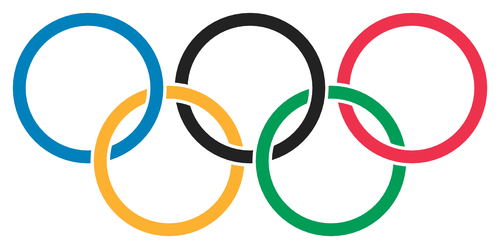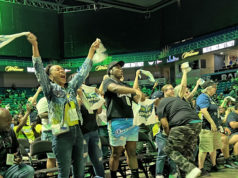The following thoughts occurred to me while I was contemplating the hairstyles on the Gabonese men’s soccer team.
The U.S. women’s volleyball team were cruising to victory in the gold medal match over Brazil when, all of a sudden, it fell apart. Brazil, the team that vanquished USA in the 2008 Olympic final, made a few defensive adjustments and got their offense going, and USA had no answer. A U.S. team that entered the tournament as prohibitive favorites and hadn’t been seriously challenged until that point lost three straight sets after taking the first set easily. Their blushes were saved somewhat by the performance of the Brazilian men the next day, who won the first two sets of their gold medal match against Russia and had two match points in the third set, only to see Russia make some wacky lineup changes and come all the way back to win the gold medal. Why didn’t USA’s women think of changing their lineup. Anyway, well done to the Russians, especially to middle blocker-turned-outside hitter Dmitri Musersky and outside hitter-turned-opposite Maxim Mikhailov, who were dominant as the match wore on.
Even bigger grief came Brazil’s way in the gold medal soccer game, which they (and I) assumed would end with Brazil finally getting the one prize in the sport that has eluded them. The Mexicans, however, had other ideas. They pounced on a defensive error by Rafael da Silva and scored 22 seconds into the match through Oribe Peralta. Peralta then got free to head in a free kick in the 67th minute. Outplayed though the Brazilians were, they almost tied the game up just before the end, but Mexico ran out with a 2-1 win, and the Telemundo announcers went insane. This might not be the biggest win in Mexican soccer history (the victory in the 1999 Confederations Cup might be bigger), but it’s a proud moment for El Tricolor. We might be tempted to read too much into this; Nigeria defeated Brazil in the 1996 Olympic final, and nothing much came of it. Still, this is possibly a sign that Mexico’s young players have learned how to deliver in big moments, something that has always been an Achilles heel for Mexican soccer. If they’ve found out how to keep their cool in the clutch, the rest of the world (and America in particular) should be very afraid. Also, between the Mexican men and the American women, North America seems to be where it’s at in soccer.
In the bronze medal match in men’s soccer, South Korea defeated its neighbor Japan, and South Korean player Park Jong-woo was prevented from taking part in the medal ceremony because he unfurled a banner after the game with an inscription that read, “Dokdo is our land.” He was referring to two islands that the Koreans call Dokdo, the Japanese call Takeshima, and Westerners call Liancourt. The islands are about 46 acres of land total and have a permanent population of two. They’re basically rocks in the middle of the sea, but they lie in fertile fishing grounds and possibly gas fields, which is why Japan and South Korea are squabbling over possession of them. Heck, even North Korea is backing South Korea over this. Park was barred from the ceremony for making a political statement, which is great, because politics at the Olympics? Who ever heard of such a thing?
In women’s basketball, USA beat France in yet another lopsided game, ending France’s charmed run of buzzer-beating victories. The French will be happy for the unexpected silver medal. USA will wonder how to generate press. Part of the reason why the women’s basketball team don’t get much attention is that they’re filled with a bunch of steady keep-calm-and-carry-on types, whereas our soccer team is more temperamental. But our basketball women wouldn’t get more press if they started pretend-feuding with each other and trash-talking, because they’re so far ahead of everybody else on the court. The reason our soccer team is so compelling is because they’re something of a hot mess on the field as well, and it’s always possible that they could lose to another talented team such as Japan or Canada. Let’s not forget, too, that USA’s women’s basketball team are mostly African-Americans, and marketing such a team to a country that is mostly non-African-American is always going to be a challenge. The NBA faces the same challenge every year, only its star power and competitiveness keeps people watching. I think the only way women’s basketball will get more run is if some other country rises up to seriously challenge USA.
On the men’s side of basketball, Spain threw an almighty scare into USA before USA pulled away in the final minutes of the fourth quarter. Spain took advantage of USA’s lack of size without Dwight Howard and Chris Bosh, and used the Gasol brothers and Serge Ibaka to pound the ball down low, while their guards shot the lights out from three-point range. Just about everything went right for Spain, yet they still came up short. Usual suspects LeBron James, Kevin Durant, and Chris Paul came through for USA on the offensive end, and Carmelo Anthony came off the bench to grab some key rebounds. (Wait, what?) With the rest of the world improving rapidly, the men’s tournament offered some fascinating games, especially the testicle-punching Spain-France game that made you say, “Man, these teams do not like each other.”
I already mentioned Erick Barrondo winning Guatemala’s first-ever Olympic medal. A number of other countries picked up their first ever as well. Botswana got theirs through Nijel Amos’ second-place finish in the 800m race behind David Rudisha. They are celebrating in that southern African nation. Gabon picked up theirs in taekwondo through Anthony Obame in the over 80 kg division. Pavlos Kontides won a silver in sailing, winning a hero’s welcome in his homeland of Cyprus. And Kirani James made sure Grenada‘s first Olympic medal was gold by winning the 400m sprint, garnering praise in his native land, which has always been overshadowed by Jamaica and Trinidad in sprinting but now has a champion to call its own. Displaying true sportsmanship, James took time out from his victory celebration to acknowledge competitor Oscar Pistorius.
Stories like these helped make the London 2012 Olympics awesome. Even big sports events like World Cup soccer tournaments are covered exhaustively, but the sheer number of athletes at the Olympics mean that there are more stories than even conscientious national press can cover. Two weeks ago I hadn’t heard of David Rudisha, and I got caught up in the story of the Masai warrior who won a first-ever Olympic medal for his tribe and broke his own world record in the process. Experiences like these are only available at the Olympics. Even though I’m ready for normal life to resume, I’ll miss that in the weeks ahead. It’s been great following the Games.













1. The United States, as the most important member of the Allies and the drafter of the San Francisco Peace Treaty, stated in the Van Fleet Report (1954) as follows:
“When the Treaty of Peace with Japan was being drafted, the Republic of Korea asserted its claims to Dokto but the United States concluded that they remained under Japanese sovereignty and the Island was not included among the Islands that Japan released from its ownership under the Peace Treaty.”
http://en.wikisource.org/wiki/Report_of_Van_Fleet_mission_to_the_Far_East
2. The 48 Allied nations signed the San Francisco Peace Treaty, which “concluded that they (Takeshima/Dokdo) remained under Japanese sovereignty and the Island was not included among the Islands that Japan released from its ownership under the Peace Treaty.”
3. South Korea must strictly observe this international determination and quit the illegal occupation of the island soon.
===========================================================
This territorial dispute between Japan and South Korea over Takeshima(Dokdo) is quite simple.
1. There is no historical fact that Korea had ever exercised any “effective control” over the islets prior to 1905.
2. Japan officially incorporated the islets in 1905 strictly following the procedures prescribed in the International law.
3. After the WW2, the Allies determined that Takeshima/Dokdo should remain as Japanese territory in the San Francisco Peace Treaty in 1951.
4. Though the South Korean government had been informed of the determination by the U.S. government in those diplomatic documents like “Rusk documents”, they ignored this international determination and started occupying the islets illegally from 1952.
Watch these videos:
Do you know the reason why Dokdo is Not Korea Land?
: http://youtu.be/zeoH8-bVhPw
Does there exist any old Korean map which depicted Takeshima/Dokdo?
: http://youtu.be/H91QN6ho8jU